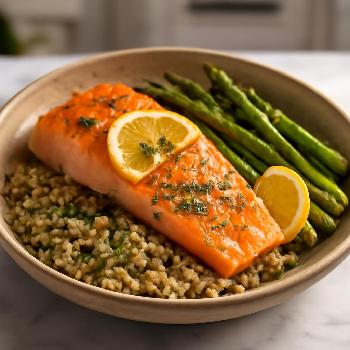Healthy & Special Diets > Recipes for Specific Life Stages > Pregnancy-Friendly Recipes > Nutrient-Dense Meals for Pregnancy
Baked Salmon with Lemon-Herb Quinoa and Asparagus
This recipe provides a complete, nutrient-rich meal ideal for pregnancy. Salmon is an excellent source of Omega-3 fatty acids and protein, crucial for fetal brain development. Quinoa offers complex carbohydrates, fiber, and protein, while asparagus provides folate and vitamins. The lemon-herb seasoning adds flavor and antioxidants.

Ingredients
- 2 6 oz Salmon fillets
- 1 cup Quinoa
- 2 cups Vegetable Broth
- 1 bunch Asparagus
- 1 Lemon
- 2 tablespoons Olive Oil
- 2 tablespoons chopped Fresh Herbs (dill, parsley, thyme)
- 2 cloves minced Garlic
- to taste Salt
- to taste Pepper
Prepare the Quinoa
Rinse the quinoa thoroughly under cold water. In a medium saucepan, combine the quinoa and vegetable broth. Bring to a boil, then reduce heat and simmer for 15 minutes, or until the liquid is absorbed and the quinoa is fluffy. Fluff with a fork and set aside.
Prepare the Asparagus
Wash the asparagus and snap off the tough ends. Toss with 1 tablespoon of olive oil, salt, and pepper.
Season the Salmon
Pat the salmon fillets dry with paper towels. Drizzle with the remaining olive oil and season with salt, pepper, and minced garlic.
Bake the Salmon and Asparagus
Preheat oven to 400°F (200°C). Place the asparagus on a baking sheet. Bake for 10 minutes. Place salmon fillets on the baking sheet alongside the asparagus. Continue baking for another 10-15 minutes, or until the salmon is cooked through and flakes easily with a fork. Squeeze lemon juice over the salmon and asparagus during the last 5 minutes of cooking.
Add Herbs to Quinoa
While the salmon is baking, stir the chopped fresh herbs into the cooked quinoa.
Serve
Serve the baked salmon over a bed of lemon-herb quinoa, accompanied by the roasted asparagus. Garnish with a lemon wedge.
Nutrition Facts Estimated per 100g of product
(These values are approximate and can vary based on specific ingredients used)
Other Important Considerations for Nutrition
During pregnancy, it's essential to ensure you're consuming adequate amounts of Omega-3 fatty acids for fetal brain development. This recipe provides a good source of these healthy fats. It is important to consult your doctor to ensure your dietary requirements are met. Ensure the salmon is fully cooked to avoid foodborne illness. The recipe is rich in folate and protein, which are vital nutrients in this life stage.
FAQ
-
Can I substitute the salmon with another type of fish?
Yes, you can substitute salmon with other fatty fish like mackerel or sardines. Ensure the fish is safe for pregnancy and cooked thoroughly. -
Can I use dried herbs instead of fresh herbs?
Yes, you can use dried herbs. Use about 1 teaspoon of each dried herb instead of 1 tablespoon of fresh herbs. -
I don't like asparagus, what can I substitute it with?
Broccoli, green beans, or zucchini are great alternatives. Adjust cooking time accordingly.
